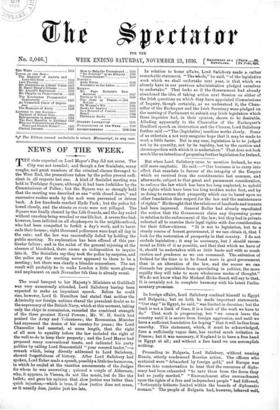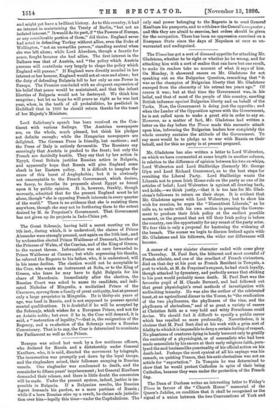Proceeding to Bulgaria, Lord Salisbury, without naming Russia, utterly condemned
Russian action. The officers who mutinied were "debauched by foreign gold," and Europe was thrown into consternation to bear that the resources of diplo- macy had been exhausted "to save them from the doom they had so justly merited." "Encroachment after encroachment upon the rights of a free and independent people" had followed, "fortunately hitherto limited within the bounds of diplomatic menace." The people of Bulgaria had, however, behaved well,
and might yet have a brilliant history. As to this country, it had an interest in maintaining the Treaty of Berlin, "but not an
isolated interest." It would do its part, if "the Powers of Europe, or any considerable portion of them," did theirs. England never had acted in defending Turkey without allies, even the Duke of Wellington, "not an unwarlike person," standing neutral when she was left alone; while Lord Aberdeen, though a fanatic for peace, fought because she had allies. The first interest in the Balkans was that of Austria, and "the policy which Austria pursues will contribute very largely to shape the policy which England will pursue." If England were directly assailed in her interest or her honour, England would act at once and alone ; but the duty of defending Bulgaria fell to her only as one Power in Europe. The Premier concluded with an eloquent expression of his belief that peace would be maintained, and that the infant liberties of Bulgaria would not be destroyed. We think him sanguine ; but let us hope he will prove as right as he was last year, when, in the teeth of all probabilities, he predicted in Guildhall that in 1886 he should return thanks for the toast of her Majesty's Ministers.



































